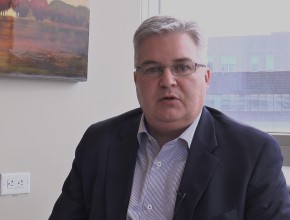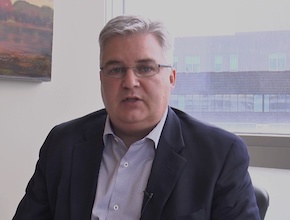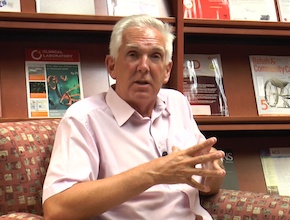References
Rejeski WJ, Ip EH, Bertoni AG, et al; Look AHEAD Research Group. Lifestyle change and mobility in obese adults with type 2 diabetes. N Engl J Med. 2012 Mar 29;366(13):1209-17. doi: 10.1056/NEJMoa1110294. PubMed PMID: 22455415; PubMed Central PMCID: PMC3339039.Roman Jaeschke: We are in Kraków during the second edition of McMaster International Review Course in Internal Medicine (mircim.eu). I would like to introduce to you Professor Maria Tiboni, who leads the medical part of preparation and perioperative care of bariatric patients in Ontario [at St Joseph’s Hospital]. Maria, I wonder if we could start by saying what kind of scale of the problem obesity is.
Maria Tiboni: There is no doubt that in North America, probably the same as in Europe, obesity has achieved epidemic proportions. There are very significant associated comorbid conditions, and it is definitely a problem in terms of resources that countries have to spend to deal with obesity.
RJ: What can we do for those people?
MT: Unfortunately, in America the treatment for obesity does not achieve substantial results in terms of weight loss and improvement of comorbid conditions. However, in the last 25 years, maybe more, we have seen that through bariatric surgery patients not only achieve sustainable weight loss but also significant improvement and resolution of comorbid conditions, such as hypertension, diabetes, sleep apnea, or fatty liver.
RJ: You have mentioned several comorbid conditions which are somehow related to obesity. I wonder if you could expand on those and tell us what is the probability that sustained weight loss could improve the situation.
MT: Fortunately, we now have more intermediate- and long-term studies showing outcomes of bariatric surgery in terms of weight loss and resolution or improvement of comorbid conditions. With the current bariatric surgeries as they are being done these days, we could see 40% to 60% or even more, up to 80% [excessive] weight loss. So, with these surgeries, especially with the malabsorptive procedures, we can definitely see resolution and significant improvement [in the control] of diabetes in the range of 70%, more or less, in the first couple of years that it is actually sustained, but probably with some relapse in the intermediate terms.
RJ: When you say 40% to 60% weight loss, we are talking about absolute weight loss or we are talking about [loss of] excess weight?
MT: We are talking about the [loss of excess weight], and it really depends on bariatric surgery that is done.
RJ: If I could step back, you mentioned medical treatments are disappointing.
MT: They are, unfortunately. We can probably reflect on the Look AHEAD study, which was a study that was done in the United States looking at intensive, interventional diet modification and lifestyle intervention for obese patients with diabetes. Although metabolic parameters did improve, the weight loss with this very intense and costly lifestyle intervention was near 6%, so – unfortunately or fortunately – we could say bariatric surgery really beats any current medical treatment.
RJ: But you see these advertisements: “Come to our clinic, we will give you this or that and you will lose 20 pounds a week or 10 kg a month or you will be happier in life, everything will get sorted out.”
MT: I think we probably all know that there is a lot of false advertisement in terms of medical treatments for obesity. The important thing with any medical or surgical treatment for obesity is intermediate- and long-term results.
RJ: You mentioned different types of surgery. Could you comment on it? What are the commonly used types, what are the differences?
MT: Historically, we have been classifying bariatric surgeries in regard to the mechanical changes that these bariatric surgeries produce, or the effects. Broadly speaking, we can categorize the surgeries into those that are restrictive – they basically create a small stomach, and patients are significantly restricted in the calories that they can eat; the other surgeries are those that are mainly malabsorptive, as a result of accompanying malabsorption by passing the small bowel. And then we have surgeries that are in between both – they have some restriction and some malabsorption.
Results and outcomes with bariatric surgeries depend on what type of surgery is offered. Simply restrictive or purely restrictive surgery will not give the same results as the surgery that is mainly producing malabsorption.RJ: Could you give us some examples of restrictive versus [malabsorptive surgeries]?
MT: The one that most people probably know is the adjustable gastric band, which is, I would like to say, mainly restrictive. On the other extreme, you have surgery like the duodenal switch, with the biliopancreatic diversion, which is a very malabsorptive surgery. I would consider those are the extremes in terms of restriction and malabsorption.
RJ: Partial gastrectomy or something called “sleeve gastrectomy” – which category of surgery does it belong to?
MT: We used to say that the sleeve gastrectomy – for people that are not familiar with the surgery: basically, the surgeon removes 70% of the stomach – was felt to be mainly a restrictive surgery. Now we understand, or we know more, that with these bariatric surgeries there are very significant changes in the physiology of the gastrointestinal tract. These surgeries are not only restrictive but also the part of the stomach that is excised is the one that produces ghrelin, which is known as the “hunger hormone” and explains well why patients after sleeve gastrectomy just do not feel hungry after the surgery. So it is not only restrictive. I do not think we can call surgeries “purely restrictive” anymore; I would say mainly restrictive, but also with associated physiological changes that we do not understand very well.
This interview was recorded at the 2nd McMaster International Review Course in Internal Medicine in Kraków, Poland. To learn more, visit www.mircim.eu.
 English
English
 Español
Español
 українська
українська








